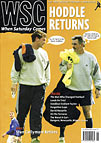 Is George Graham's departure a victory for Tottenham tradition? No, says Paul Kelso, he paid the pricce for not winning football matches
Is George Graham's departure a victory for Tottenham tradition? No, says Paul Kelso, he paid the pricce for not winning football matches
Since George Graham was turfed out to make way for the Second Coming at White Hart Lane there has been so much talk of The Spurs Way that the uninitiated would be excused for thinking Haringey Council were renaming the Tottenham High Road. Of course many clubs have a distinct self-image, an unwritten statement of principle based in equal parts on tradition and nostalgia – West Ham’s academy, Everton’s school of science or Wimbledon’s school of hard knocks – but at Spurs the blend is particularly potent.
The punditry that filled the silence between Graham’s departure and Hoddle’s appointment placed much emphasis on the new manager’s understanding of this tradition, rather than his ability to deliver results and trophies. Gary Mabbutt, who, in his unspectacular way represented the reality of Tottenham as much as Hoddle the player represented the dream, managed to capture all the cliches.
“Glenn Hoddle embodied as a player everything Tottenham are about,” he said. “The fans have needed Hoddle and his memory more than ever over the last few years because of the strong Arsenal connections that became associated with the club. Hoddle is somebody who understands the traditions of Spurs and knows what is expected of the club.”
Had he been speaking about any other club, Mabbutt might have mentioned the need to clear out £30 million worth of journeymen, shore up a porous defence and turn around an appalling away record. But this is Spurs, where practicalities have often been obscured by the obsession with the aesthetic. Danny Blanchflower started it when, long after he had finished playing and the need for points on a wet Wednesday was but a memory, he said: “The game’s about glory. It’s about doing things in style, with a flourish…” Hoddle himself echoed Blanchflower in 1988, long before he revealed himself to be a far more pragmatic coach than he was a player: “People forget that football’s not just about running fast… For many, constructive and creative play are of very little consequence.”
The principles of which they spoke are the reason many of us love the club. Until Graham disposed of David Ginola at least Spurs had always played to the strengths of the most gifted individual rather than try to subjugate them to the team ethic, and maverick talents have been indulged long after others would have packed them off to the J-League. Of course, the reality has often fallen short of the dream. For every Blanchflower there was a Mackay, for every Hoddle a Graham Roberts to do the dirty work. But there has been precious little glory in the past five years and the insulation these principles provided against Arsenal’s greater success have worn a little thin since they started playing like, well, like Tottenham.
But it would be wrong to say, as Graham’s tabloid cheerleaders have, that his downfall was speeded by the opposition of one-eyed Arsenalphobes more interested in sepia-tinted myth than reality. Style is important, but it’s not everything. Graham’s real crime was producing the worst Spurs team in 25 years, those of Christian Gross included. Playing in predictable straight lines, shorn of invention, Graham’s Spurs were uninspired at home and a soft touch on the road. From a healthy start that brought the club the Worthington Cup he took the side backwards, buying badly and, as at Leeds, only turned to youth when injury left him with no choice.
They couldn’t even defend; in the last two seasons under Graham’s tutelage Spurs kept just 23 clean sheets in 82 games, conceding 106 goals. Simply, Graham lacks the wit and imagination required to win in the modern Premiership, where the breathtaking pass and move of Manchester United, Leeds and Arsenal dominates.
Style is important to all fans, and for proof you need look no further than Highbury, where the boring is apparently cherished. Yet in the good old days of Terry Neill the North Bank lived for the occasional glimpse of the unexpected from as limited a player as Charlie Nicholas. They loved Graham because he delivered trophies, not because he could organise a back four. But they love Wenger even more because now they win with panache, with players any club would cherish.
Graham didn’t simply offend some sacred Tottenham sensibility in guiding the club to 11th, tenth and 12th in his three seasons, but he couldn’t afford to play the way he did and lose. Hoddle, too, would do well to examine Blanchflower’s words in full: “It’s about doing things in style, with a flourish. It’s about going out and beating the other lot, not waiting for them to die of boredom.” With the emphasis on the beating.
From WSC 171 May 2001. What was happening this month